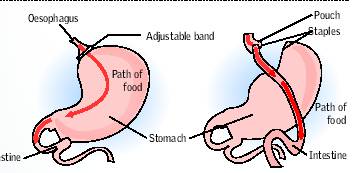Mumbai: Canadian Patricia Gobert arrived in Powai in April 2005, carrying the baggage of her 190-kg frame and the trauma of a failed surgery to shed her excess weight. But she had a dream. She told herself that the next time she crossed the Pacific to meet her parents, she would be lighter by a few kilos. A series on online consultations and visits to the nearby Hiranandani Hospital later, as a gift to celebrate her “first anniversary in Mumbai’’, she underwent a minimally invasive gastric bypass surgery on April 3.

A result perhaps of the combination of a boom in private medicare, the emergence of newer techniques and anti-obesity support groups, more and more obese people are opting for surgery, the most drastic way to lose weight. A fortnight after Patricia’s procedure, husband Brian decided to undergo the same. “It’s destiny that we came to India, found helpful medical people and underwent the operation,’’ said Brian (49).
If the US recorded over 1.5 lakh such surgeries in 2005, India’s modest boom translated to over 300 people opting for it every year. Medical tourism, said experts, would help the segment flourish especially because US insurance companies were stringent about eligibility for such surgeries. India, on the other hand, had no such checks.
M Lakdawala, who operated on the Goberts, believes there is another factor fuelling the rush for anti-obesity surgery on desi shores: family power. “Patricia and Brian aren’t the only family who have tried out surgery. I have had cases in which sisters have inspired each other, a mother-in-law inspired her son-in-law or a daughter’s surgery helped a mother make a decision,’’ said the Lilavati Hospital consultant.
According to Ramen Goel, secretary of the Indian Association for Advancing Research in Obesity, more and more obese patients were becoming open to surgical options.

“Five years ago, if we had 20 patients a month, only one would be open to surgery. Now, almost 50% of the patients coming to us ask for surgery as the first option,’’ he said. But is the ‘cut’ really the best way to lose weight? Goel pointed out that two-thirds of obese patients on diet put back their lost weight within a year. “So surgery has a better chance of helping such patients’’.
Endorsing his viewpoint is a study by Monash University stating that surgery was significantly more effective for long-term weight loss in obese patients than diet and exercise. The Melbourne researchers said surgical patients lost an average 20.5 kg after two years compared with 5.3 kg for a diet and exercise group. However, Lakdawala felt that surgery should not be the first option. “It is only the option for those morbidly obese. Persons with a BMI (body mass index) between 40 and 50 are the only ones who should look at surgery,’’ he said.
Endocrinologist Shashank Joshi felt lifestyle modifications were the best option for most obese people, except a “select few’’ with a BMI of over 40. Many experts were also concerned with the controversies surrounding bariatric surgery (see box). A study by the Journal of American Medical Association (JAMA) had in its October 2005 issue voiced several safety issues, including high death and repeat hospitalisation rates among patients who underwent obesity surgeries. But as a doctor who didm’t want to be identified pointed out, “Different obesity operations have varying risks.
Patients can opt for the gastric band (around the mouth of the stomach) that has the lowest risk as compared to the gastric bypass (using staples or to bind a part of stomach).’’ But the last word on the surgery vs dieting debate comes from patients themselves. For the first time in her 50 years, Patricia Gobert has lost 15 kg in a month. “I feel a sense of healing inside,’’ she said.

